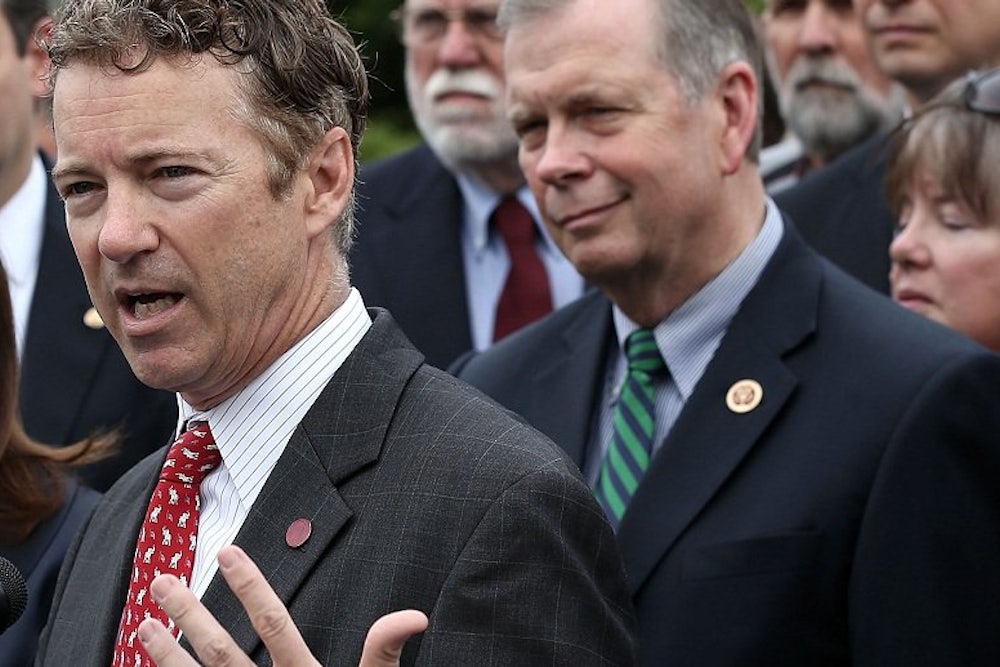The debate over the IRS scandal officially became ludicrous on Thursday, when Republicans decided to use it as a cudgel for bashing Obamacare.
The day started with Republican lawmakers warning darkly that, under Obamacare, the Internal Revenue Service would use its power to pry into individual medical records or otherwise invade personal liberty. “That’s part of Obamacare,” said Senator Rand Paul. “I’m worried that some of our privacy will be violated.” On Twitter, House Majority Whip Eric Cantor wrote, “RT if you think we should keep #IRS out of your healthcare and repeal #Obamacare.”
The day ended with the revelation, by ABC News, that Sarah Hall Ingram, the woman formerly in charge of the tax exempt division, is now working for a different department—the one in charge of the agency’s Obamacare duties. Within minutes, that story was splashed on Drudge and conservative websites. (A sample headline from Townhall: “Unreal: IRS Official who Oversaw Tareting Scandal Now In Charge of Obamacare Division.”)
Perhaps it was inevitable that Republicans would conflate two of the ideas they hate the most: Obamacare and the collection of taxes. But the notion that Obamacare meaningfully expands the power of the IRS, let alone that it will give its bureaucrats control over how people get medical care, is beyond laughable.
It’s true that the IRS performs several of Obamacare’s critical functions. Starting next year, the IRS will be distributing the tax credits that will make insurance affordable for millions of Americans. The IRS will also be responsible for enforcing the “personal responsibility requirement”—a.k.a., the individual mandate. To do that, it must figure out who has insurance, and then, under certain circumstances, impose a tax penalty on people who do not.
Republicans have unified in opposition to the mandate, which many of them once championed, ever since Obama adopted embraced the idea. They say it’s an unprecedented, un-American invasion of liberty. Those arguments have resonated with many Americans, and now the Republicans hope to tap into that feeling to stir up more opposition to the health care law. For all that I know about public opinion, the Republican gambit will succeed.
But it shouldn’t. The medical privacy nightmare is a figment of the libertarian imagination. The IRS will never see an actual medical record, let alone meddle with decision-making by doctors and hospitals. The agency will deal entirely with financial matters—how much money you make and whether you have insurance.
As for the mandate, it’s pretty weak. It includes all sorts of exemptions—for people who are poor or whose insurance options would cost more than 8 percent of income, as well as people who object to insurance on religious grounds. More important, it has a flimsy enforcement mechanism. If you’re assessed the penalty and choose not to pay it, the IRS can take only one step: It can withhold future tax rebates, should you qualify for any. And that’s it. By law, failure to pay the penalty carries no other consequences.
I suppose Republicans might worry that agents would treat exemption appeals from certain people more skeptically, just as the IRS employees in Cincinnati zeroed in on non-profit conservative groups for scrutiny. But if you’re worried about the IRS discriminating against individuals, selective application of a modest, non-enforceable tax penalty seems like a trivial matter given the other options the agency has at its disposal. After all, the IRS has the power to conduct audits, which can be brutal, and dial income tax penalties way up or down.
This isn’t the first time Republicans have used the IRS to go after Obamacare. Previously, they have tried to cut off funding for IRS employees who would work on Obamacare. “I didn’t trust them before last week and I damn sure don’t trust them now,” Congressman Michael Burgess of Texas told Politico, expressing a common and undoubtedly heartfelt sentiment. But any program that helps people pay for health insurance is going to need revenue to support it. If the IRS isn’t the agency collecting that revenue, which one should take its place? The Pentagon? The Education Department?
The IRS treatment of tax-exempt applications is a serious matter, one that deserves public attention. But don’t be fooled. Republican opposition to Obamacare has nothing to do with the recent scandal—and everything to do with the fact that they oppose the very idea of universal health care. You may or may not agree with them, but nothing that’s happened in the last two weeks should have changed your opinion.
Jonathan Cohn is a senior editor at The New Republic. Follow Jonathan on Twitter @CitizenCohn
